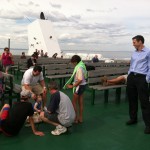What’ll It Be — an Island or a Part of the Main?
Question: What’s the difference between an island and a continent?
Answer: Huge, or nothing at all. Check tectonic plates.
Spend a few days driving around the coast of Maine, going over all those bridges and seeing water constantly, and you’re apt to wonder if you’re on an island or actually a peninsula, still attached to the mainland. Then you might also start to wonder whether you need to pay attention to this distinction anyway. 
I mean, do the millions of people in Manhattan actually feel as if they’re floating in their own Idaho, so to speak?
Back up in Maine, what is clear is that everybody who likes to get around has a motorboat, and that when they go to a nearby little island, say one off their particular peninsula, they really know how to pack those big L.L. Bean bags.
John Donne wrote a famous poem –Meditation XVII (and I just bet it was religious) about how we really ought not to consider ourselves cut off from the rest of humanity:
No man is an island,/ Entire of itself,/ Every man is a piece of the continent,/ A part of the main.
Fair enough, except that we all know perfectly well that most of the time—let’s face it – we’re more in our own heads than anywhere else. We pay attention to certain key relationships, try to do our best with those, and many of us also in fact really do listen to the larger beating heart of humankind. Still and all, our island qualities are sometimes unmistakable.
I’ve been on a couple of different kinds of ferry boats — those conveyances that bring us back and forth to islands – recently, and it struck me funny how just the experience of riding aboard one can both clarify our own self-ness in the vast universe as well as prompt us to connect ourselves to strangers. On the same trip, I saw a man (oh, it’s my husband!) pondering who-knows-what while enjoying a tranquil moment looking out to sea:
And then, a few seconds later, I also saw another man, dressed for the office, leave the book that he was reading to approach a little group – a family plus others –who were clustered around a dog. He wanted “in” although he kept himself just a bit apart:
Somehow it was the ferry itself, or the experience of being on a kind of island that was the boat heading to a larger island, that provided new opportunities for either pulling in or for looking out, depending on your point of view.
Together on a long drive recently, with time to bandy stuff around, my husband and I had a chance to talk about whether islands or continents prevail during most church services. (Truth be told, we were mostly quiet in the cab of that U-Haul truck, each with our own thoughts; for spurts of time, however, we conversed. In general, I’m the half of the relationship that prefers using car time for conversation – he is an advocate of productive silence, particularly on Saturdays during sermon generation. But I digress.) We agreed that a church service offers opportunities both for individuals to dive down into their own souls as well as to feel part of the congregational fabric, although the bishop with his hands on the steering wheel said he believed the latter experience predominates…provides more of the reason for going to a service to begin with.
As he sometimes does, he took the opportunity here to teach me a little something from his divinity school days (or maybe from his own theological investigations). Apparently, the exchanging of the Peace — when we turn to those around us, reach for hands, and say “Peace be with you” –is an example of something called “proleptic speech.” Now before you go thinking, as I did, how that sounds like what happens when a part of the body goes frozen, collapses, or goes otherwise out of whack — let me explain. It’s a kind of utterance that conveys hope for something that’s probably not yet fully realized, a wishing it forward. According to my husband, this helps explain the power of much of the liturgy: words, sometimes accompanied by gestures, can be transformative.
Here I might as well admit that, while I am very much an extrovert, I’ve never been particularly keen on repeating the same words in succession to different people around me. This might be one reason why I never trained for the ministry. I’m more comfortable saying something distinct to each individual, like “I have a funny story for you at coffee hour” or “I wish you stamina for the care-giving you’re doing” or even “What a great haircut!” It’s undeniably true, of course, that each one of us can benefit from a dose of (if not complete) peace; it’s just that sometimes the sentence sounds a tad, well, forced.
 Maybe I need to get over myself here a bit, that’s all. I mean, it’s not as if I have to try to say something original each time I speak. And has it occurred to me that people may actually want my island-ness, and theirs, to be bridged momentarily through this particular utterance, so that we might feel more like parts of a continent, together?
Maybe I need to get over myself here a bit, that’s all. I mean, it’s not as if I have to try to say something original each time I speak. And has it occurred to me that people may actually want my island-ness, and theirs, to be bridged momentarily through this particular utterance, so that we might feel more like parts of a continent, together?
The next time I find myself looking out over the rocks to sea on a summer’s day or a moonlit night, I’m definitely going to think about it.




THANK YOU POLLY… THAT WAS VERY WELL WRITTEN !!!! ENJOY YOUR WORDS….
LARRY